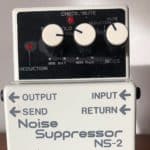Making music is wonderful.
However, not everybody thinks the same.
From parents to neighbors, from teachers to siblings. Anybody could find your ukelele playing a nuisance.
After all, there is a time and place for everything, and many believe that playing after midnight is neither the appropriate time nor place.
But what happens if you still need to play? After all, you are a musician, and not playing is not a choice.
Is there a way to make your ukelele quieter?
Well, the good news is, there are 4 different ways!
There are different ways to make your ukelele quieter. They include switching from pluck to fingerstyle playing, to applying tape to the soundhole. Also, you could try playing softly, and even placing Sugru on the saddles.
Ukelele players. If you are in need of reducing the sound of your instrument, you are in the right place.
Here you’ll find all the information you were looking for.
Why would you need to make your ukelele quieter?
Believe it or not, a ukelele could sound louder than you expect it to sound.
This is strongly related to the size of the ukelele.
After all, there are four different types of ukeleles: tenor, baritone, soprano, and concert.
The generic rule is that, the larger the ukelele, the louder it is. That is to say, baritone and tenor ukeleles are much louder compared to the rest of the instruments.
Other factors influence as well, including the string material, and the style of playing (the last one is a differentiation between finger playing and pick playing)
Now, this results in many players opting to reduce the sound of their ukeleles.
The reasons are many, but the most prominent one can be summed up in a single word: neighbors.
You know, those people who live next door and complain whenever you are playing too loud?
Yes, those who called the police the last time you were rehearsing. Those are the problem.
See, we understand musicians playing at 3 AM. Passion is hard to control.
Unfortunately, non-musicians will understandably complain when a ukelele sound interferes with their sleeping.
So, to find a balance is to be able to play without making too much noise.
Another reason for making the instrument quieter would be to play in your room without waking up your family.
All in all, it seems that everyone is bothered by ukeleles. However, this is an issue that every musician faces.
Now, which are the solutions?
4 ways of making your ukelele quieter
If you want to avoid any potential issues (such as policemen knocking on your door), here’s what you can do to make your ukelele a quieter instrument.
1. Playing softly
This is the easiest trick for avoiding potential problems.
Playing softly is rather simple. All you need to do is get rid of the pick, and exert less amount of force when strumming the strings.
These techniques drastically reduce the sound produced by the instrument, making it possible to play satisfactorily without having to bother people.
2. Seal the soundhole
Sealing or taping the soundhole reduces the sound.
For example, you could try applying some paper to the soundhole. A piece of cloth will also work.
This dampens the sound and softens the vibration.
However, be careful when sealing the soundhole.
You run the risk of damaging your instrument if you don’t place the material carefully.
3. Fingerstyle playing
Fingers are “calmer” than a pick. That is to say, you can expect a lowering in sound when using your fingers.
It is no surprise. Strumming with a pick boosts the sound of the ukelele, as it does with any other string instrument, including bass and guitar.
Switch to fingers, at least for a while.
4. Mouldable glue
Roll a piece of Sugru with your hands, then place it in the ukelele’s saddle.
Then press the piece of mouldable glue against the saddle. Try not to push too hard, though.
That way, you ensure the string does not vibrate too much, and of course, you make sure you are making the ukelele quieter.
Strange, isn’t it?
Are there any downsides to making your ukelele quieter?
Of course, reducing the sound of your ukelele should be a choice for those who must mute their instruments.
Otherwise, there is no need of trying any of these techniques.
Why? Because the main downside of making your ukelele quieter is, to no surprise, making it quieter!
See, musicians love hearing their instruments as loud as they can. That includes guitarists, drummers, keyboardists, and even bassists.
So, why would ukelele players want to diminish the sound their instruments produce?
On the contrary, they want to hear it as much as they can.
So, not being able to fully enjoy the sound of a ukelele has to be the main disadvantage.
Also, remember that applying a dry cloth (a sock, for instance) could damage your instrument. If you are not careful, you may break the ukelele’s wood when putting the cloth inside the soundhole.
Needless to say, this is the biggest downside of them all.
You can also work on the insulation of your practice space
Have you ever thought about finding ways to avoid sound coming out of your room?
You could have noise-reducing drywalls installed instead or regular walls. However, we understand that this idea is too much of an effort.
So instead, we recommend softening the surfaces. Add carpets everywhere, both on the floor and the walls.
Also, seal every gap you find, including windows and doors.
Lastly, consider implementing white noise to mask the instrument’s sound.
There are devices designed to produce a warm and static sound that covers any other unwanted noise.
Nonetheless, you don’t have to purchase anything. There are dozens of Youtube videos that generate white noise.
Give them a try and see if your neighbors still complain.
If they are still bothering you, then you may move to a different house… okay, that’s too much. Better stick to the tips mentioned above.

Hello there, my name is Ramiro and I’ve been playing guitar for almost 20 years. I’m obsessed with everything gear-related and I thought it might be worth sharing it. From guitars, pedals, amps, and synths to studio gear and production tips, I hope you find what I post here useful, and I’ll try my best to keep it entertaining also.





